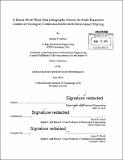A direct-write thick-film lithography process for multi-parameter control of tooling in continuous roll-to-roll microcontact printing
Author(s)
Nietner, Larissa F
DownloadFull printable version (26.65Mb)
Other Contributors
Massachusetts Institute of Technology. Department of Mechanical Engineering.
Advisor
David E. Hardt.
Terms of use
Metadata
Show full item recordAbstract
Roll-to-roll (R2R) microcontact printing ([mu]CP) aims to transform micron-precision soft lithography in a continuous, large-scale, high-throughput process for large-area surface patterning, flexible electronics and engineered meta-surfaces. Efforts to implement this hybrid process have been limited by the inability to monitor and control the process and the lack of a continuous large-area polymer tool that embodies micron- to nano-scale patterns currently created with wafer-based lithography. Discontinuities arising from a wrapped image carrier, size limitations from silicon wafer sizes, difficulty in achieving uniform stamp thickness, and inability to monitor the contact region, pose challenges in scaling up [mu]CP to R2R processing. This work examines a new technique to produce seamless cylindrical tools for soft lithography using laser-based maskless lithography for micro-patterning. The process is parameterized and modeled to fabricate novel tooling structurally optimized for microcontact patterning. Positive-tone photoresists SPR 220 and AZ 9260 are examined in their process sensitivity and in their ability to provide tools for scalable [mu]CP. A fluorescent contact imaging technique is presented on the basis of fluorescent, layered composite PDMS image carriers. By adding fluorescent microparticles to PDMS, the stamp is shown to re-emit UV upon contact with the substrate. To scale the process for use in large-area applications, a machine design is suggested for a scalable implementation of the examined technique, which has the potential to provide large-scale microstructured tools and thereby facilitate process control and enable scale-up of microcontact printing.
Description
Thesis: S.M., Massachusetts Institute of Technology, Department of Mechanical Engineering, 2014. Cataloged from PDF version of thesis. Includes bibliographical references (pages 167-173).
Date issued
2014Department
Massachusetts Institute of Technology. Department of Mechanical EngineeringPublisher
Massachusetts Institute of Technology
Keywords
Mechanical Engineering.